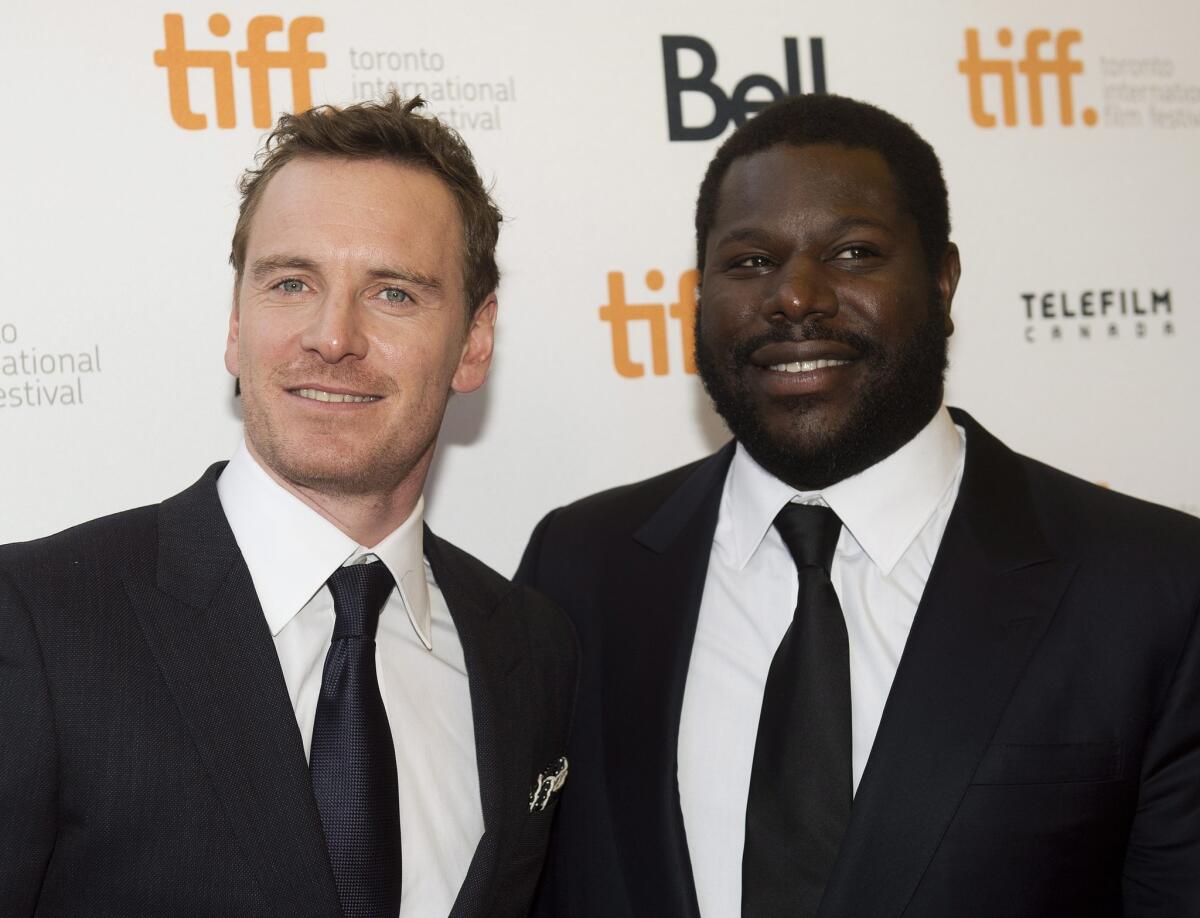TIFF 13: Did Steve McQueen’s ’12 Years a Slave’ just change the game?

TORONTO -- Brad Pitt didn’t say much during the question-and-answer session that followed the Toronto International Film Festival premiere of “12 Years a Slave” on Friday night, just a short comment on why he produced and co-starred in the Steve McQueen period drama.
But, like his turn as an abolitionist-minded maverick amid a group of brutal slaveowners, Pitt spoke volumes as he stood on the stage with cast and filmmakers. “If I never get to participate in a film again,” he said, his voice trailing off as if to imply this would be enough, “this is it for me,” he finally finished.
It’s a sentiment you could imagine the lead cast members -- Michael Fassbender, Lupita Nyong’o and of course Chiwetel Eijiofor, standing out amid the standouts -- sharing with Pitt. And it’s a sentiment you could imagine the audience feeling. Festivals come and go; movies rise and fade. But once in a great while there’s a film that feels almost instantly, in the room, like it’s going to endure, and change plenty of things along the way. And “12 Years” offers that feeling.
INTERACTIVE: Toronto International Film Festival 2013 trailers
Most narrowly, that’s true on Oscar level. By 9 p.m. Friday night, just six days into September, the film had already become a top contender for various acting, writing and directing prizes, as well as the big prize. You could say that’s premature. But you probably wouldn’t if you sat in the room. (Vulture’s Kyle Buchanan certainly didn’t hold back.)
It’s equally true on a social level. “12 Years” tells the fact-based story of Solomon Northup (Eijiofor), a free man who in 1841 was kidnapped and sold into slavery, and his travails -- at once horrifying and surprising, no matter how much you think you’re ready for them -- when he is trafficked to a series of Southern plantations for more than a decade.
The movie has many of the hallmarks McQueen has become known for -- the meticulous composition, the bold and haunting sequences -- but, far more than previous films “Hunger” and “Shame,” it has a galvanizing topicality. (For more on “12 Years” and how it was made see my colleague John Horn’s excellent piece in the Sunday Times.)
PHOTOS: Fall movie sneaks 2013
It also has the kind of bracing honesty that has always been rare in Hollywood and is even rarer these days, a Hollywood where, if tough issues are taken on at all, it’s under the garb of respectful period drama or easy sentiment.
Slavery is pretty much at the top of that list of tough issues. With films like “Django Unchained” and “Lincoln,“ the subject has have become slightly less taboo in the past few years -- but only slightly. “Roots” broke new ground on TV more than three decades ago, yet few have followed in its path. McQueen is finally willing to pick up the trail.
But maybe that feeling of change was most apparent because the movie went beyond its ostensible subject of race and the fight for emancipation. After the screening, several people I was sitting near began comparing the movie, favorably, to other films about race. A worthwhile comparison. But the film also evoked parallels to a more unexpected movie, “Schindler’s List.” Exactly 20 years ago that film paired impressive filmmaking with a wrenching subject, and in so doing achieved something remarkable -- used cinema to change the way we view a cataclysmic period we thought we knew. “12 Years” has the power to do the same thing.
PHOTOS: Hollywood backlot moments
As this movie rolls out this fall, people will talk about the questions it raises, about the evolution of race relations, about what it’s saying on the matter of slavery, whether nearly 150 years after the end of the Civil War there is resolution or closure, whether there can ever be resolution or closure.
And there will be, inevitably, a backlash, people who will question the choices McQueen made, will scrutinize whether this detail softpedals the history or that detail overplays it, whether he went too far or not far enough, whether he fetishizes too much or too little.
Mostly, people will talk about slavery in a way they haven’t before because by seeing the film they’ll experience it in a way they never have before. McQueen on Friday summed up his reason for making a movie about slavery thusly: “For me it was a no-brainer. I just wanted to see it on film. I wanted to see that history on film. It was important. It was that obvious. And that’s it,” he said, putting a period on the sentence. But the conversation is only just beginning.
ALSO:
‘12 Years a Slave’ juxtaposes beauty, brutality
TIFF 13: Assange pic ‘Fifth Estate’ a crystal ball into fall
Chilly climate among ‘Blue Is The Warmest Color’ actors and director
Follow me on Twitter at https://twitter.com/ZeitchikLAT
More to Read
Only good movies
Get the Indie Focus newsletter, Mark Olsen's weekly guide to the world of cinema.
You may occasionally receive promotional content from the Los Angeles Times.











